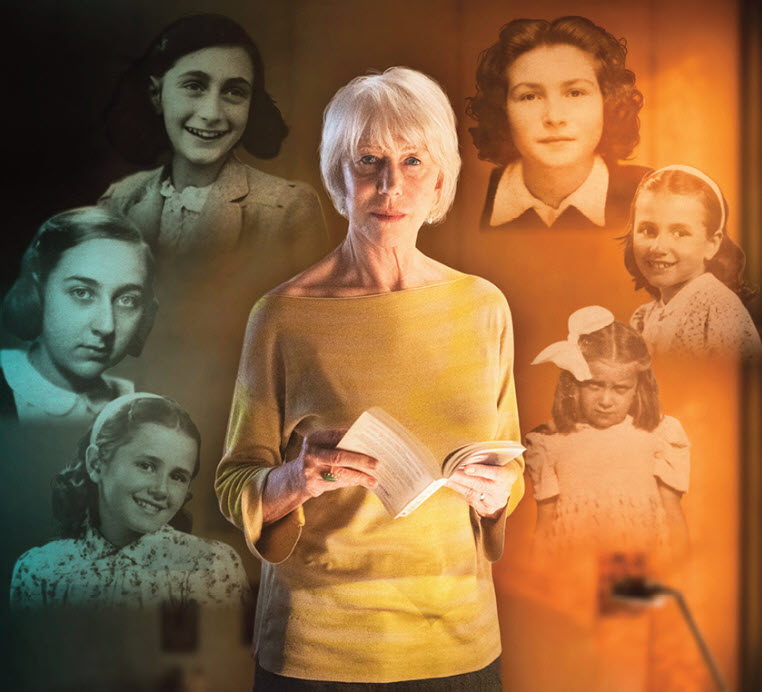Anne Frank: Parallel Stories
Reviewed by: Ruth Eshuis
CONTRIBUTOR
| Moral Rating: | Better than Average |
| Moviemaking Quality: |
|
| Primary Audience: | Older-Teens Young-Adults Adults |
| Genre: | Documentary |
| Length: | 1 hr. 32 min. |
| Year of Release: | 2019 |
| USA Release: |
October 2019 March 5, 2020 |
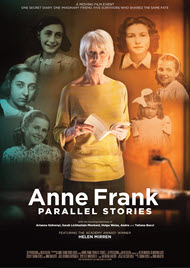

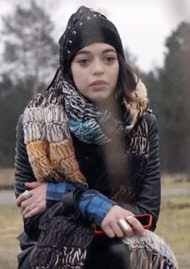
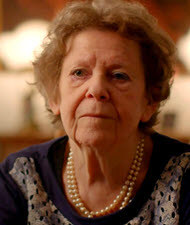
The evils of antisemitism
Racism—What are the consequences of racial prejudice? Answer
The Holocaust, aka the Shoah ( שׁוֹאָה )—World War II genocide of European Jews (1941-45)
About the fall of mankind to worldwide depravity
How to respond to extreme evil
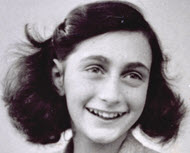
Annelies Marie “Anne” Frank was a German-born Dutch-Jew who lived most of her life in or near Amsterdam, Netherlands and wanted to become a writer.
In 1940, she and her family were trapped in Amsterdam by the Nazi German occupation of the Netherlands and as Nazi cruelty grew over the following years, the family was forced into total hiding.
The Franks were liberal Jews, who did not observe all of the customs and traditions of Judaism
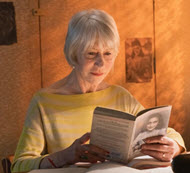
The book based on Anne’s diary is titled The Diary of a Young Girl, also known as The Secret Annex.
Being cruelly forced by the Nazis into a series of hard labor concentration camps
Enduring suffering as a young person
Fighting fear, even under the most inhumane conditions
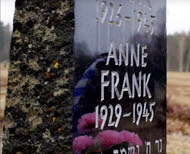
Anne was eventually transferred to the infamous Auschwitz concentration camp and later relocated to the Bergen-Belse camp where she died in a typhus epidemic (1945).
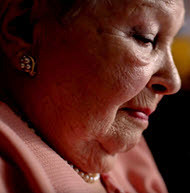
Why does God allow innocent people to suffer? Answer
What about the issue of suffering? Doesn’t this prove that there is no God and that we are on our own? Answer
Does God feel our pain? Answer
ORIGIN OF BAD THINGS—Why are they in our world if a good God created us? Answer
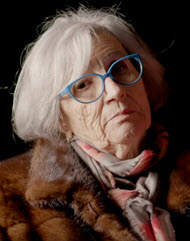
Enduring persecution
The hope of The Kingdom of God, Heaven and the justice of God
The Final Judgment of God on unredeemed sinners
About UTTER DESPAIR, FEAR and ANXIETY and about HOPE
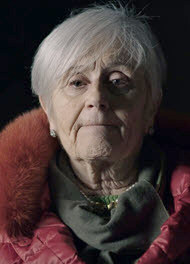
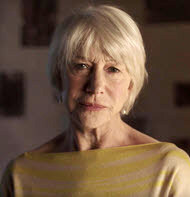
| Featuring |
|---|
|
Helen Mirren … herself Martina Gatti … Martina, a girl of today learning about Anne Arianna Szörenyi … herself Sarah Montard … herself Helga Weiss … herself Andra Bucci … herself Tatiana Bucci … herself Rabbi Michael Berenbaum … himself —historian and professor of Jewish studies Marcello Pezzetti … himself —Holocaust historian Nathalie Zajde … himself —French ethno-psychologist Doris Grozdanovicova … herself —witness Fanny Auchbaum … herself —witness Francesca Dego … herself —world-renowned violinist Yves Kugelmann … himself —publisher and member of the Anne Frank Fonds Basel Ronald Leopold … himself —director of the Anne Frank House Alain Granat … himself —director Jewpopo online magazine Simon Daval … himself —photographer |
| Director |
|
Sabina Fedeli Anna Migotto |
| Producer |
|
3D Produzioni [Italy]
Nexo Digital [Italy] See all » |
| Distributor |
“A moving film. One secret diary. One imaginary friend. Five survivors memories.”
For the mature-minded, strong-hearted and capable readers, this documentary offers a grounded and enriching introduction to Anne Frank and the perspective of teen girls during the most calculated and widespread genocide that has ever been attempted. For Christians who’ve marveled at the attitudes of Friedrich Bonhoeffer or Betsy and Corrie ten Boom, another layer of knowledge about the persecution is added. For us who may never set foot in Europe, we can tour places that were significant in Anne’s story. And for those who have been told to doubt whether The Holocaust (or Shoah) occurred, this film bluntly settles the issue.
Like my recently-deceased grandmother, Anne Frank was born in 1929 and grew up in the Netherlands during the second world war. They both would have turned 90 this year, but Oma got married, had children and lived a long and satisfying life, while the few turbulent days of Anne’s childhood and youth would be all she’d ever get. But Anne didn’t know the future, so, like my Oma (whose memoirs we also have), Anne lived vibrantly. She delighted in sunshine, disagreed fiercely with her family and dreamed of what she might become someday, just as any teenager does.
Yet tragically, Anne’s messages to the world would be limited to what is written on her diary’s pages, for all Jews were being systematically crammed like livestock into trains and sent away to death camps. It was only a matter of time before the same fate would find Anne and her family. This threat forced them all into hiding in a converted warehouse. This meant a life of muted frustration which could only be freely expressed in the cherished journal. Addressing an imaginary friend (the diary) named Kitty, Anne’s rambling thoughts and emotional reactions became grimmer as news items filtered through and the household grappled with the worsening situation in Europe. For three years they hid and hoped until the Nazis burst in and dragged them all away. Their hopes must have fallen. Fortunately for us, though, Anne’s diary also fell to the floor and was kept safe, to someday share Anne’s fascinating journey with each successive generation of adolescents.
Put bluntly, it’s a sad story, an ugly topic and a deeply regretted period of history. It’s impossible to make that gentle or suitable for children to view, or safe for those with mental illness. It will be difficult for most viewers to take in. Yet I cannot imagine any better way to present the horrible truth than with the tenderness and consideration this documentary affords. Its lessons from the past, selectivity and respect do much good.
Moviemaking
Generally, the production quality is excellent. It is well thought-out, through, sombre and dignified and gently paced to aid reflection.
Clever cinematography helps us feel like we’re at the memorial sites ourselves, or touching the checked material covering Anne’s diary, or lying on her bed staring up at the happy movie stars on her walls. We look deep into sad eyes, we examine tattooed numbers on forearms, we gaze speechless at video clips of malnourished bodies and shocking mass burials.
Viewers do not need to know much about Judaism, Israel, Nazism or The Holocaust (Shoah) in order to understand what is going on. However, given that the interviewees come from several countries and some speak very fast, teenage viewers have commented that sometimes it’s hard to keep up and understand the flow. The ability to quickly read subtitles will help a lot.
The main moviemaking aspect I’m not keen on in “Anne Frank: Parallel Stories” is the narrator’s performance (Helen Mirren)—yes, it feels too much like acting, rather than genuine feeling. Her words are great, but the overemphasized pauses and sighs unfortunately distract from the topic. Initially this could annoy viewers, because it feels like emotional manipulation. But by the end you may decide differently. Also, keep in mind that Anne herself is criticized by her parents for moodiness and melodrama. The narrator could simply be imitating Anne’s style.
Apart from that, the film seems remarkably balanced and unmuddied. The makers have chosen interviewees well, including young people of many nationalities, even German. Music is suitably reflective and mournful—not too sweet, nor of any particular culture. Images and film clips greatly assist in evidencing the stark realities of what Nazis intended, talked about and did to fellow human beings.
Finally, the approach is highly original. I think it’s clever and relatable that they’ve used a 21st century teen through whose eyes we learn. I’m impressed with the decisions to avoid bad language and smut, as well as any footage of violence occurring, nor weapons, nor to dwell on the political aspect at all. For this the producers have earned my high respect. It keeps the focus squarely on the problem of individual choices to do evil and not do good, and individual consequences that affect whole families. So, expectations are greatly outshone.
Building up a picture of Anne’s generation
The film’s purpose is not merely to tell the story of Anne Frank, as many have before, or to visualize her environment and the facts of her life, but rather to look at Anne’s generation of teenagers and open up specifically for young people the difficult questions of how such blind evil could occur, before asking how each of us will respond.
We begin with the image of a dollhouse, a model of Anne’s hidey-home, a place of both comfort and torment while the ruthless Nazis hunt them. Narrator Helen Mirren introduces Anne from her early photographs and diary entries. Attention then turns from the narrator to the teen tourist (#KatherinaKat), at each place she visits to learn a little more of Anne, and the concepts brought up there. Eyewitnesses, historical experts, statistics and other teens of Anne’s age—now in their 80s and 90s—provide insights. Tweets (social media postings) with the tourist’s musings often ask a question, signifying when it is time to move on to the next harrowing site. Then the narrator reads another portion from Anne’s diary and connects it to real footage of what was happening in Europe at that time, and the cycle repeats. This usually works well.
Content Warnings
As previously mentioned, the makers have tried to keep “Anne Frank: Parallel Stories” quite clean. Absolutely no reference is made to alcohol, smoking, drugs or other vices. And I know that Anne’s diary contains several crude or sexual references, but none are specifically stated in the film. However, there is some mild sensuality in the dramatized recount of Anne’s first kisses.
No misuse of God’s or Jesus’ names occurs. There is quite understandably a brief mention of many losing faith in God because of their persecution. And though the narrator may hold Feminist principles and try to stress that at times, and it is mainly women who are featured, there’s nevertheless no push of girl-power, or any other idea, religion or faith, for that matter.
I do not recall any other expletives except the word sh** just once. It is used literally, speaking about waste or excrement, but at the same time about people whose physical condition has become so messed that the captors justify their destruction as mere waste disposal. This is included to both appall and assist with comprehension of the (faulty) logic behind the guards’ failure to treat their captives humanely.
Perhaps a choice has been made to minimize quantities of coarse material because producers knew that there’d already be such heavy content to deal with.
Beware, though, it is highly troubling to empathetic persons to even hear about the extremes of cruel and dehumanizing behaviors perpetrated by the Nazis, and even the offense of bystanders ignoring the plight of the dying. In the normal sense, there’s almost no violence in this film: no guns, bombs, tanks or vision of anyone being hurt. What a surprising approach! And yet the film refers to some of the scariest and most heartless treatment of human beings in the last century. Seeing real footage of healthy people carrying dirty skeletal corpses to mass graves, or a doctor examining a naked and malnourished child with haunted eyes or hearing about the tortures and medical experiments forced upon random people is deeply unsettling. Even the dry statistics are chilling. So please be sure to view this documentary yourself before showing it to young or vulnerable people.
Consequently, there are many potential triggers for those with mental illnesses such as anxiety, depression, PTSD or grieving. Yet I reaffirm that the approach is much gentler than comparable films and documentaries about Anne and her traumatized generation. Brace yourself to hear about trauma, suicide (only briefly), gassings, Nazis’ disregard for the dying and dead, a crushing sense of doom and some survivors’ inability to forgive.
A mirror for us all
Through Anne’s diary, survivors’ recollections and historical footage, we can feel as though we are there with Anne.
The narrator declares that the glimpse into Anne’s household is like watching ourselves and imagining how we and our families would react in the same situation. Would we not become irritable, wildly rebellious and drawn into fantasies as an escape from our ‘prison’? Would we pretend, ignore mistreatment, or conform ourselves in order to keep safe and comfortable? Could we still be ‘me’ at all?
Of course, looking in a mirror is not always pleasant, but it is important. If we see bad signs, we can do something to stop them from worsening.
Also, in this ‘mirror’ we feel uncomfortable as we see the footage of embarrassed villagers who’ve been living alongside the German concentration camps without opposing them (for if they had, their lives would surely have been cut short). As a consequence for turning a blind eye to gross evils, the locals are forced by Allied soldiers to enter the concentration camps, view the extreme destruction and personally handle the bodies, granting them proper burial.
“The moral lesson: it’s very much about those little moments… choices.”
Will we pause and do what’s right, or what’s safe for us? Would we dare to speak out against unfair oppression, at risk to our lives?
Lastly, the mirror also forces us to see the truth, that we as humans are all capable of intense evil. When we hear about the governors who were persuaded to support Hitler in his patriotic ideals, the prison guards who craved the powerful thrill of their successes, the disbelieving nearby German citizens who just minded their own business, and the few Jews who under huge pressure and in terror betrayed others whom they knew would soon die anyway… we can imagine ourselves falling into traps like these, and making excuses. Whatever part we individually play, as a species, we are fallen, selfish, dangerous to one another and often behave in ugly ways.
Anne, Adolf and Adolescence
Anne’s story is so poignant because it represents the moods and thoughts that millions of people went through—heights of joy, fury, sorrow, hope and so on. At times, she’s someone we wouldn’t like. Anne reacts unkindly, then loathes herself for it. She thinks she’s being driven mad by the flawed people around her and longs for “what I’d like to be, and what I could be, if only there were no other people in the world.”
But for all her outbursts, Anne’s presence is valuable to her household and later readers, because her sense of hope is particularly strong. “I still believe, in spite of everything, that people are truly good at heart,” says Anne. Expressing all this emotion creatively in writing helps her endure. Similarly, another survivor has coped because of her drawings. The positivity of youth “continue[s] to fuel the illusion of possible freedom.” It is one of the great benefits of young innocence, as well as a hazard at times.
Not only do Anne and her peers endure much; they gain, by God’s common grace, maturity and perseverance through suffering (Romans 5:3). Anne realizes how fickle the issues she previously complained over were. She wrestles with loss and clings with faith to her dreams and ideals. A girl becomes a woman both physically and inwardly. She develops a romantic appreciation for a boy who stays with them in hiding. She deals with all the possibilities of the brightest or darkest of futures. Longing to one day ‘afterward’ become a famous author. Anne edits her diary, believing the government’s assertion that all suffering of the Dutch people will be published following the war. She knows that her words could someday help someone.
“Her… words have made many teens grow up. They became the symbol of the horror of the 20th century.”
“Imagine the talent that Germany destroyed. When you destroy children, you destroy infinite possibility.”
And the experts and survivors wisely point out that on both sides they were destroyed: the brainwashed female wardens degraded themselves in the brutal acts they committed in order to have power and respect. The guards were teens like Anne, just wanting to be strong and respected and beautiful.
These are some of the realizations that #KaterinaKat sadly absorbs during her own journey, looking for voices of survivors, wanting to know and feel connected to the past… Our world’s heritage and the evils we mustn’t repeat.
Spiritual Darkness
The main theme of “Anne Frank: Parallel Stories” is the reality of extreme evil’s existence and its potential to take charge in our world. So much darkness, fear and constant threat hung over the inhabitants of The Annex, and later those transported to the ‘work camps’ that would snuff out their lives. How can such a beautiful world also contain such darkness? How can one cope with its presence and overcome it?
In prosperous western countries we know some difficulties, but rarely a stifling community-wide darkness, dread and culture of death. Yet history shows how quickly and easily nations can descend into horrendous evil.
Hitler’s sales pitch was to create a ‘master race’ out of Germany, but he also intricately planned to exterminate all Jews from the earth. He shared this ambition with all his leaders, and together they strategized how to use people like animals and to have them destroy themselves, with the least amount of work for the captors. It was deliberate and mean, especially the concentration camps built purely for extermination, the suffocating cattle trucks used to transport them there and the manipulations that fostered terror, betrayal, family separation and abandonment of faith.
This is evil. An absence of godliness. Replacement with selfishness, power-lust, hatred and disregard for God’s gift of life. Reckless, uncaring destruction. Calling good ‘evil’ and evil ‘good’ (Isaiah 5:20). Female guards being nicknamed ‘witches.’ Children playing among piles of corpses because it had become normal to them. Opposition to God’s specific plans and promises to sustain Israel to the end, blessing the world through their Messiah. Instead of caring for the vulnerable, they rounded them up and tried to remove them. All this was the work of Satan.
What is also evil, though, is when relatively-innocent people react to evil with their own brands of evil. Some have refused to believe that The Holocaust could be true. Others have become convinced that the Nazis were right and have been ‘inspired’ to continue their antisemitic work. Revenge, self-destruction and taking the pain out on family members are also works of Satan.
“Does time erase memories?” one woman asks. No, not always. But God’s grace can always heal and always somehow bring powerful good from the experiences He has sustained and taught us through.
Spiritual Answers
Despite taking documentary form and containing minimal mention of religion, ‘Anne Frank: Parallel Stories’ raises huge spiritual and religious issues. Several characters suggest answers or partial answers to the great WHY of The Holocaust, or to how to bring good out of it. One (the narrator) seems to favor Feminism; another says that the arts can help; another bluntly says that regarding Auschwitz, “there is no [answer to] ‘why.’ ” Since it is not a Christian production, it is up to us as Christian leaders, educators, parents and friends to fill in the gaps and highlight The Creator’s answers for Earth’s problem with evil. These same answers can be found in both the Jewish scriptures (which are also our Old Testament) and Christian scriptures (the Old and New Testaments).
In her diary, Anne acknowledges that there’s both a good and an evil part to her—a childish, selfish part and a purer, deeper, finer part—the identity she wants to step into. Her wrestle is to transition from the old instinctive self into a new and better person, through deliberate choice. This is an important part of every stage of life, but perhaps adolescence most of all. Despite not being a devout Jewess, Anne shows some awareness of the similarities and differences between Jews and Christians. My hope is that perhaps Anne in the concentration camps may have met a true Christian such as Corrie ten Boom, who was telling the Good News to everyone, and thus giving them a deep and certain assurance that takes the sting out of death (Hosea 13:14; 1 Corinthians 15:50-58). This secret is that Jesus Christ is the Messiah (Moshiach), the Son of God, who was promised for the Jews, and Who amazingly fulfills hundreds of Old Testament prophecies, especially that He Himself bears the punishment for the sins of the world and frees us to share eternity with God in blameless, joyful satisfaction, where there is no more death, mourning, crying or pain (Isaiah 65:18-20a; Revelation 21:2-4).
What about us today?
Is there any chance of The Holocaust happening again? One survivor expresses worry about the recurring rise of antisemitism (anti-Jew feelings) in societies with ‘too much’ free expression. The film insists that there is no place for Holocaust denial, revision/negation (re-writing history books) or conspiracy theories where these have already been thoroughly debunked by mountains of evidence.
Is there any blatant evil in front of us which we pretend is not our responsibility? Turning a blind eye to evil is evil, and we should not be overcome by evil, but should instead overcome evil with good (Romans 12:21).
One of the interviewed experts says he would compare the situation of refugees or displaced people, many of whom are driven into danger because of heartless oppression. So, if we are convicted and repelled by the events of Anne’s generation, even today we can work against these sorts of problems. We can speak out against evil, for those who can’t speak for themselves. Remember that God cares very much for the vulnerable and even writes social justice into His law. He encourages the Hebrews to remember that once they were slaves in Egypt and foreigners with no homeland… so show the mercy and compassion you would want to be shown (Matthew 7:12), like The Good Samaritan. If we close our eyes to the hurting, we will one day have our shame exposed by the Lord, the Judge of the Earth who sees all. Even if some meet with no punishment in this lifetime,
“There is nothing concealed that will not be made disclosed or hidden that will not be made known.” —Matthew 10:26
Could you and I forgive such atrocities? Many Holocaust survivors say they cannot forgive. Nevertheless, some of the most hurt have forgiven, out of response to how Jesus has forgiven and loved them.
Final Comments
So, to sum up this long and enthusiastic essay, I heartily recommend this documentary. “Anne Frank: Parallel Stories” is a thought-provoking first look, or reminder, of the realities ofs teens affected by The Holocaust. Those viewers who live far from the European death camps, who may never have a chance to visit and drink in the enormity of WW2’s tragedy, can feel it here. It also presents a timely reminder of why Holocaust denial is a crime in some countries: the issue has long been completely settled and to say otherwise offensively ignores the immense evidence and continuing traumatization.
The memory of Anne, her generation and their legacy are well represented and honored. The stories of Anne and her ‘parallels’ who escaped the concentration camps prompt viewers to think deeply about the existence of extreme evils in the world, and hopefully to ask some big questions about God… which we Christians can answer from God’s word.
The moviemaking is quite good and having a teen-targeted approach is original and useful. Content is kept very clean, except that there’s plenty of footage and discussion of badly mistreated people.
As a result, it’s suitable for mature audiences only, including older teens, not kids. And certainly, don’t take along anyone who might mock parts, because the mood in each theater will be very serious. Parents, also beware that teen girls who watch it may be quite likely to then want to read Anne’s diary, which contains some mild sexual comments. Another similar, but Christian, account suitable for adults and older teens, is The Hiding Place by Corrie ten Boom, available in book or film form.
Although “Anne Frank: Parallel Stories” is a great film to see, it has a large gap where Jesus belongs, so please make the most of the opportunity to share the Good News and don’t leave with only sadness. Perhaps approach it as you might approach any tragedy: holding firmly to the illumination and certainty we have in Christ Jesus, the Jewish Savior, and of the day of judgment and restoration which is yet to come.
“Dearest Kitty (diary / imaginary friend),
It’s utterly impossible for me to build my life on a foundation of chaos, suffering and death.
I see the world slowly being transformed into a wilderness. I hear the approaching thunder that, one day, will destroy us too. I feel the suffering of millions.And yet, when I look up at the sky, I somehow feel that everything will change for the better,
that this cruelty too will end,
that peace and tranquility will return once more.In the meantime, I must hold on to my ideals. Perhaps the day will come when I’ll be able to realize them!
~Yours, Anne M. Frank.”
- Nudity: Moderately Heavy
- Violence: Moderate— • Extreme brutality reported and implied, but no glorification, and minimally shown • Damaged bodies seen, though • Extreme evil (genocide) reported and implied
- Vulgar/Crude language: Mild
- Sex: Minor
- Profane language: None
See list of Relevant Issues—questions-and-answers.
The following short videos are NOT from the “Anne Frank” film or its producers; there is no relationship whatsoever. However, we are including these here because they are very relevant, eye-opening, encouraging and inspirational…


PLEASE share your observations and insights to be posted here.
